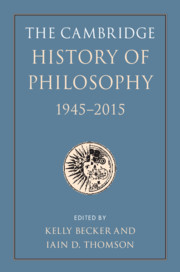Book contents
- The Cambridge History of Philosophy, 1945–2015
- The Cambridge History of Philosophy, 1945–2015
- Copyright page
- Contents
- Contributors
- Preface and Acknowledgments
- Introduction
- Part I Analytic Philosophy
- Section One Language, Mind, Epistemology
- Section Two Logic, Metaphysics, Science
- Section Three Analytic Moral, Social, and Political Philosophy
- Section Four Analytic Aesthetics and Philosophy of Religion
- 24 Analytic Aesthetics and Philosophy of Art
- 25 Philosophy of Religion
- Part II Continental Philosophy
- Part III Bridge Builders, Border Crossers, Synthesizers, and Comparative Philosophy
- Part IV Epilogue: On the Philosophy of the History of Philosophy
- References
- Index
25 - Philosophy of Religion
from Section Four - Analytic Aesthetics and Philosophy of Religion
Published online by Cambridge University Press: 08 November 2019
- The Cambridge History of Philosophy, 1945–2015
- The Cambridge History of Philosophy, 1945–2015
- Copyright page
- Contents
- Contributors
- Preface and Acknowledgments
- Introduction
- Part I Analytic Philosophy
- Section One Language, Mind, Epistemology
- Section Two Logic, Metaphysics, Science
- Section Three Analytic Moral, Social, and Political Philosophy
- Section Four Analytic Aesthetics and Philosophy of Religion
- 24 Analytic Aesthetics and Philosophy of Art
- 25 Philosophy of Religion
- Part II Continental Philosophy
- Part III Bridge Builders, Border Crossers, Synthesizers, and Comparative Philosophy
- Part IV Epilogue: On the Philosophy of the History of Philosophy
- References
- Index
Summary
At the beginning of the period covered, Logical Positivism was still regnant, though no longer invincible. In the preface to the second edition of Language, Truth, and Logic, A. J. Ayer writes, “In the ten years that have passed since Language, Truth, and Logic was first published, I have come to see that the questions with which it deals are not in all respects so simple as it makes them appear” (Ayer 1952: 5). And given how central the notion of verification is to the verification principle, it is very non-trivial that he admits “I have to acknowledge that my answer [to the question What is verification] is not very satisfactory” (9). And then again, “Concerning the experiences of others [the “Problem of other Minds”] I confess that I am doubtful whether the account that is given in this book is correct” (19). And yet again about the emotive theory of value, “I must acknowledge that the theory is here presented in a very summary way, and it needs to be supported by a more detailed analysis” (20). This is significant, for it sets the stage for a major transition, though one still some time off. For the present, Ayer would try to save his principle. Here is his 1946 restatement of the infamous Principle of Verification: “[A] statement is held to be literally meaningful if and only if it is either analytic or empirically verifiable” (9).1
- Type
- Chapter
- Information
- The Cambridge History of Philosophy, 1945–2015 , pp. 334 - 346Publisher: Cambridge University PressPrint publication year: 2019



